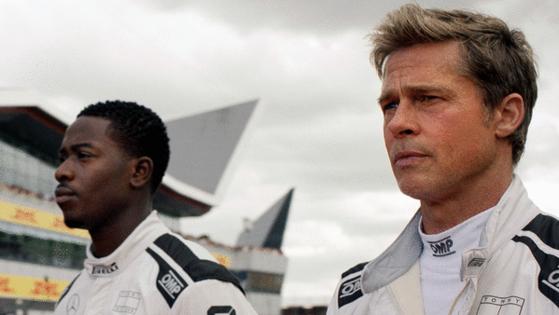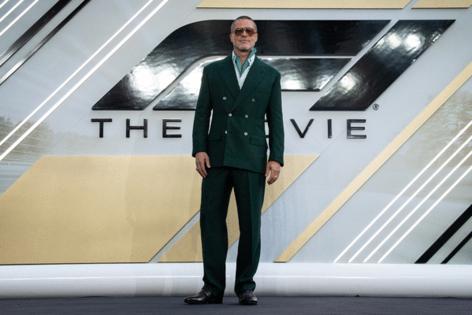After 'F1' speeds off, what's next for Apple's film business?
Published in Entertainment News
LOS ANGELES — The $145 million global opening of Apple’s “F1 The Movie” came as a relief — both for the iPhone maker itself and theater operators hoping for an original hit during this sequel-dominated summer of blockbusters.
The expensive Brad Pitt action sports drama, directed by Joseph Kosinski (“Top Gun: Maverick”) and produced by Jerry Bruckheimer, was a high-stakes gamble by the Cupertino-based tech giant, which until now has enjoyed little success at cinemas.
In the U.S. and Canada, the film did better than expected, generating $57 million in ticket sales through Sunday, according to studio estimates. Analysts were projecting $40 million to $50 million, based on prerelease tracking. Warner Bros. Pictures, which is on a much-needed hot streak, distributed “F1” in partnership with Apple.
Because the movie cost at least $200 million to make (and perhaps far more, according to some reports) after tax breaks and before significant marketing costs, the picture is still far from profitable. But with strong reviews from audiences and critics — an “A” CinemaScore, 83% “fresh” on the Tomatometer and 97% approval from moviegoers on Rotten Tomatoes — the film should continue to perform well in the coming weeks.
It’ll face some serious competition, with Universal Pictures’ “Jurassic World Rebirth” arriving in theaters Wednesday for the Fourth of July holiday weekend and Warner Bros.’ “Superman” from James Gunn coming shortly afterward.
Nonetheless, “F1” has the all-important Imax screens locked down until “Superman,” and that should be an advantage, given that the movie plays like both an old-school blockbuster and a thrill ride.
The question now: What does this mean for Apple’s film business and how the company approaches theatrical releases in the future?
Since Apple got into Hollywood six years ago with the launch of Apple TV+, the movie slate has struggled to come up with a big-screen success, despite huge spending on prestigious projects and big-name talent.
Its Sundance acquisition “CODA” won the 2022 best picture Oscar, albeit in a weird year, in a first for a streaming company.
But Martin Scorsese’s “Killers of the Flower Moon” and Ridley Scott’s “Napoleon” weren’t commercial hits. “Argylle” and “Fly Me to the Moon” flopped, and “Wolfs” was scaled back from its planned theatrical release. The Miles Teller-Anya Taylor-Joy feature “The Gorge” went straight to streaming.
Analysts and movie industry insiders have speculated that the performance of “F1” would heavily influence whether Apple dove further into blockbuster filmmaking or abandoned theaters altogether. Apple certainly treated it like a high-stakes release, having Chief Executive Tim Cook give an interview with Variety and promoting the film through various parts of the company, including its retail stores and its music, fitness, maps and podcast apps.
Apple lacks an in-house theatrical distribution arm and instead enlists traditional studios for those duties. Burbank-based Warner Bros. worked with Apple on the marketing side while also contributing financially to the campaign, according to people close to the studios.
As of now, it’s unclear what Apple’s ambitions are for the multiplex.
Spike Lee’s Denzel Washington-starring thriller “Highest 2 Lowest,” a reimagining of the 1963 Akira Kurosawa classic “High and Low,” is getting a miniature theatrical window from A24 ahead of its September streaming release on Apple TV+. Apple has already inked a deal for another upcoming Kosinski-Bruckheimer collaboration, about UFOs.
An Apple spokeswoman did not respond to a question about future movie plans.
Theater owners want to see more from Apple at a time when they’re often struggling with a lack of compelling material, especially for grown-ups. With “F1,” they saw a glimpse of hope.
“F1” is a racing movie with throwback vibes, which is no guarantee of success. But the F1 brand is strong, especially internationally, where the movie is doing particularly well ($88.4 million so far). The companies sold the movie as a sort of “Top Gun: Maverick” on wheels, an approach that resonated with audiences. People familiar with the data say the film is drawing in audiences who don’t typically go to theaters, which the theaters desperately need.
The box office performance bodes well for the title’s eventual streaming release on Apple TV+.
With the exception of Netflix, which remains set against doing a true traditional theatrical business, film studios say movies that open in theaters do better on streaming than if they’re simply dumped onto a crowded service. Amazon has again committed to theaters since acquiring MGM Studios after slinking away from the business model years ago.
On the other hand, theatrical releases are risky, especially for a company that cares about its reputation the way Apple does. Flops are embarrassing, even for a company that’s worth $3 trillion and can afford to subsidize a filmmaker’s vision.
In both movies and TV, Apple has been selective with its programming strategy.
It doesn’t have a vast library or a deluge of new releases to keep people interested the way Netflix does. Thus, its subscriber counts have lagged the bigger rivals with more voluminous offerings, according to analysts. (Apple doesn’t disclose subscriber numbers.)
Ask anyone in Hollywood why, exactly, Apple is in the movie business at all and you’ll get varied answers.
Of course, the company wants to grow Apple TV+, which Apple views as part of a larger play to boost its services business. Having a hit movie, in theory, should help with that. People who work with Apple will often argue that the company is more interested in the branding glow that comes with a great movie than whether any particular title makes money.
The company has developed a reputation for quality, especially with buzzy TV projects including Jon Hamm’s “Your Friends & Neighbors,” Seth Rogen’s “The Studio” and, more recently, “Stick” starring Owen Wilson.
“We studied it for years before we decided to do [Apple TV+],” Cook told Variety. “I know there’s a lot of different views out there about why we’re into it. We’re into it to tell great stories, and we want it to be a great business as well. That’s why we’re into it, just plain and simple.”
For Apple, the question of whether to commit to the blockbuster business is a billion-dollar component of a $3 trillion car.
©2025 Los Angeles Times. Visit at latimes.com. Distributed by Tribune Content Agency, LLC.
















Comments